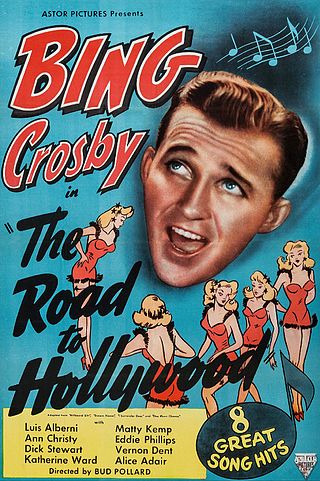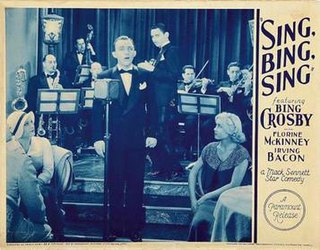
Harry Lillis "Bing" Crosby Jr. was an American actor, singer, television producer, television and radio personality, and businessman. The first multimedia star, he was one of the most popular and influential musical artists of the 20th century worldwide. Crosby was a leader in record sales, network radio ratings, and motion picture grosses from 1926 to 1977. He was one of the first global cultural icons. Crosby made over 70 feature films and recorded more than 1,600 songs.

Mack Sennett was a Canadian-American producer, director, actor, and studio head who was known as the "King of Comedy" during his career.

Educational Pictures, also known as Educational Film Exchanges, Inc. or Educational Films Corporation of America, was an American film production and film distribution company founded in 1916 by Earle Hammons (1882–1962). Educational primarily distributed short subjects; it is best known for its series of comedies starring Buster Keaton and the earliest screen appearances of Shirley Temple (1932–34). The company ceased production in 1938, and finally closed in 1940 when its film library was sold at auction.

Bing: A Musical Autobiography was Bing Crosby's fourth Decca vinyl LP, recorded and released in 1954.

The Rhythm Boys were an American male singing trio consisting of Bing Crosby, Harry Barris and Al Rinker. Crosby and Rinker began performing together in 1925 and were recruited by Paul Whiteman in late 1926. Pianist/singer/songwriter Barris joined the team in 1927. They made a number of recordings with the Whiteman Orchestra and released singles in their own right with Barris on piano. They appeared with the Whiteman orchestra in the film King of Jazz, in which they sang "Mississippi Mud", "So the Bluebirds and the Blackbirds Got Together", "A Bench in the Park", and "Happy Feet". They are best remembered for launching Crosby's solo career, one that would make him the greatest song charting act in history and one of the most influential entertainers of the twentieth century.

Harry Barris was an American popular singer and songwriter. He was one of the earliest singers to use "scat singing" in recordings. Barris, one of Paul Whiteman's Rhythm Boys, along with Bing Crosby and Al Rinker, scatted on several songs, including "Mississippi Mud," which Barris wrote in 1927.

Al Rinker was an American musician who began his career as a teen performing with Bing Crosby in the early 1920s in Spokane, Washington. In 1925 the pair moved to Los Angeles, eventually forming the Rhythm Boys trio with Harry Barris.

"I Surrender Dear" is a song composed by Harry Barris with lyrics by Gordon Clifford, first performed by Gus Arnheim and His Cocoanut Grove Orchestra with Bing Crosby in 1931, which became his first solo hit. This is the song that caught the attention of William Paley, president of CBS, who signed him for $600 a week in the fall of 1931.

The Road to Hollywood is a 1947 American film released by Astor Pictures that is a combination of several of Bing Crosby's Educational Pictures short subjects. The title was designed to draft off Paramount Pictures' "Road to..." film series starring Crosby, Bob Hope, and Dorothy Lamour; Hope and Lamour do not appear in the film.

One More Chance is a 1931 Educational-Mack Sennett Featurette starring Bing Crosby and directed by Mack Sennett. This was the second of the six short films Crosby made for Sennett and which helped launch his career as a solo performer. This film is notable for Crosby first singing on film his classic hit "Wrap Your Troubles in Dreams" which is sung to a bevy of giggling overweight Native American maidens who gradually close in on him. He also sings "Just One More Chance" which topped the various charts of the day in 1931.

"At Your Command" is a 1931 song recorded by Bing Crosby on June 24, 1931 with piano accompaniment by Harry Barris. The lyrics were written by Bing Crosby and Harry Tobias, The music was composed by Harry Barris.

Confessions of a Co-Ed is a 1931 American drama film starring Phillips Holmes, Sylvia Sidney and Norman Foster, and featuring a rare onscreen appearance by the musical Rhythm Boys. The picture was directed by David Burton and Dudley Murphy, and the convoluted plot involves a college student who marries the wrong man then grapples with a dilemma when the actual father returns. At the beginning of the movie, Crosby, Barris and Rinker perform the fast-paced "Ya Got Love" at a fraternity party after Crosby sings his current hit "Out of Nowhere."
Gordon Clifford was an American lyricist who wrote music for Hollywood films in the 1930s. His best-known songs include Nacio Herb Brown's "Paradise", Alfred Newman's "Who Am I?" and Harry Barris's "It Must Be True" and "I Surrender Dear".

Loyce Whiteman (1913–1989), also known as Lois Whiteman, was an American popular singer.
15 Minutes with Bing Crosby was Bing Crosby's first solo radio series, which aired on the CBS network from September 2, 1931 until October 31 of the same year. It was to have a major impact on his career.

Dream House is a 1931 Educational-Mack Sennett Featurette starring Bing Crosby and directed by Del Lord. This was the third of the six short films Crosby made for Sennett and which helped launch his career as a solo performer.

Billboard Girl is a 1932 Educational-Mack Sennett Featurette starring Bing Crosby and directed by Leslie Pearce. This was the fourth of the six short films Crosby made for Mack Sennett and which helped launch his career as a solo performer.

Sing, Bing, Sing is a 1933 Mack Sennett Star Comedy starring Bing Crosby and directed by Babe Stafford. It was the fifth of the six short films Crosby made for Mack Sennett and which helped launch his career as a solo performer.

Blue of the Night is a 1933 Mack Sennett Star Comedy directed by Leslie Pearce and starring Bing Crosby. It was the last of the six short films Crosby made for Mack Sennett and which helped launch his career as a solo performer.
"I Surrender Dear" is a 1931 jazz song.
















